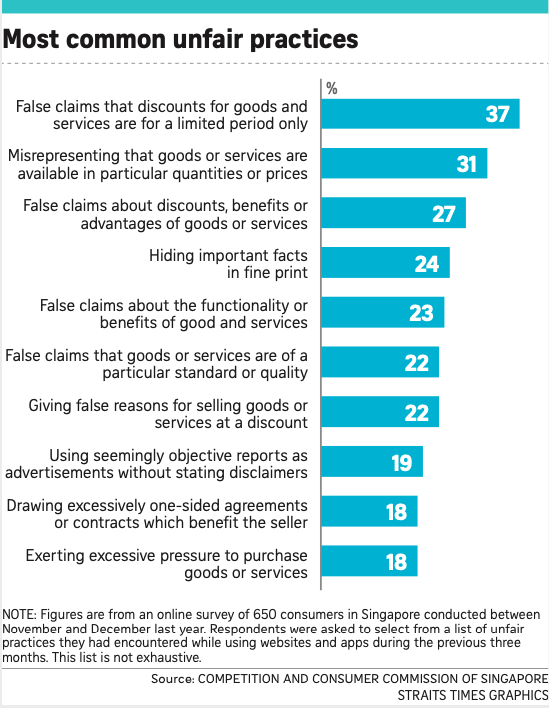Two-thirds of online shoppers in Singapore encounter unfair practices such as false claims on discounts: Study


While Mr Al Wu was working at home in June, an Instagram advertisement for an adjustable-height desk caught his eye.
Convinced by the sleek photos and rave reviews, he placed an order on the website, Bikkuri Shop.
But the delivered product - costing about $70 - did not work as advertised, Mr Wu told The Straits Times. More than two months and dozens of e-mails to the vendor later, he has yet to receive the product exchange he was promised.
"They asked for cash on delivery, so there's not much I can do. I didn't have that level of caution," said the 44-year-old researcher, who rarely shops online.
Such encounters with online sellers are not uncommon, according to a survey published by the Competition and Consumer Commission of Singapore (CCCS) yesterday.
It found that over a three-month period, about two-thirds of consumers encountered unfair practices on online platforms.
False claims relating to discounts or benefits, limited time deals and scarcity of goods or services were the top complaints.
The survey of 650 people, conducted online between November and December last year by economic consultancy Frontier Economics, formed part of a market study on the e-commerce landscape in Singapore.
Misleading advertising practices like those highlighted in the survey have been addressed in the price transparency guidelines that will take effect from Nov 1, the CCCS noted in a 97-page report on the market study.

The guidelines will set out how the agency will interpret and enforce consumer protection laws going forward.
While the guidelines will apply to all vendors that supply goods and services to consumers in Singapore, observers noted the challenges in enforcing the law against overseas-based online sellers.
Mr Wu, for example, was told by the Consumers Association of Singapore (Case) that he had little recourse as the vendor in his transaction was not registered in Singapore.
The market study found that some e-commerce platforms had measures in place to protect shoppers from unscrupulous sellers, such as pre-payment protection schemes.
A spokesman for Lazada said its consumer protection measures include a demerit point system for errant sellers that can result in suspension.
The five-month study also sought views from e-commerce industry players and platform suppliers.
Industry members interviewed cited challenges in policing their platforms, with one characterising it as a cat-and-mouse game where bad sellers constantly find new ways to evade detection of unfair practices.
The survey findings suggested that more could be done to foster a fair trading environment, the CCCS said, adding that it will work with the industry to promote good practices and consumer education.
The findings coincide with a spurt in online shopping amid the Covid-19 pandemic and its related restrictions.
Total visits to e-commerce platforms in Singapore during the first half of the year grew by 23 per cent, a study by iPrice Group and SimilarWeb found.
Case executive director Loy York Jiun said there is added urgency for more platforms to adopt best practices in the light of this trend.
"In addition, Case hopes that e-commerce platforms will be more proactive in identifying online sellers who make false or misleading claims, and take stronger action to weed out these errant sellers."
This article was first published in The Straits Times.